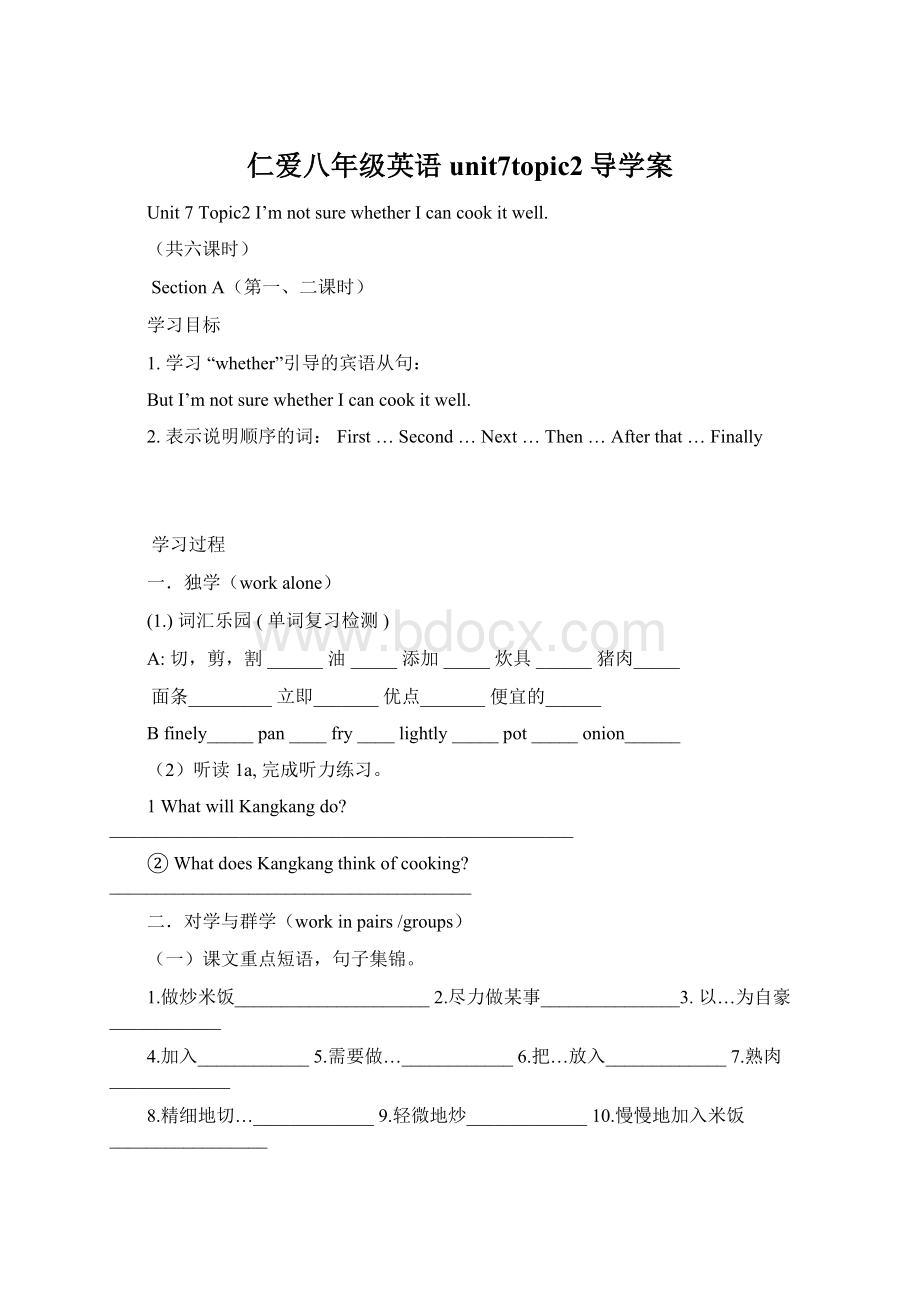仁爱八年级英语unit7topic2导学案.docx
《仁爱八年级英语unit7topic2导学案.docx》由会员分享,可在线阅读,更多相关《仁爱八年级英语unit7topic2导学案.docx(16页珍藏版)》请在冰豆网上搜索。

仁爱八年级英语unit7topic2导学案
Unit7Topic2I’mnotsurewhetherIcancookitwell.
(共六课时)
SectionA(第一、二课时)
学习目标
1.学习“whether”引导的宾语从句:
ButI’mnotsurewhetherIcancookitwell.
2.表示说明顺序的词:
First…Second…Next…Then…Afterthat…Finally
学习过程
一.独学(workalone)
(1.)词汇乐园(单词复习检测)
A:
切,剪,割______油_____添加_____炊具______猪肉_____
面条_________立即_______优点_______便宜的______
Bfinely_____pan____fry____lightly_____pot_____onion______
(2)听读1a,完成听力练习。
1WhatwillKangkangdo?
__________________________________________________
②WhatdoesKangkangthinkofcooking?
_______________________________________
二.对学与群学(workinpairs/groups)
(一)课文重点短语,句子集锦。
1.做炒米饭_____________________2.尽力做某事_______________3.以…为自豪____________
4.加入____________5.需要做…____________6.把…放入_____________7.熟肉_____________
8.精细地切…_____________9.轻微地炒_____________10.慢慢地加入米饭_________________
11.加一些盐_______________12.首先___________13.其次_________14.接下来____________
15.然后___________16.之后________________17.最后_________________
18.我不确信我是否能做好。
__________________________________________________.
19.我很高兴你在尽力帮助别人。
_______________________________________________.
20.做得好___________________________21.你是太好了。
.______________________________.
22.你愿意我帮你吗?
___________________________?
(二)听读课文,情景对话。
三组内小展示。
(下面这些知识点,你一定要记住呀!
)
1.Itiskindofyou.常用于表扬赞美对方。
—Herearesomeapples,helpyourself.—_____________________.(你真是太好了)
(拓展)
(1).bekindtosb__________eg.Wemust_________________(善待)theold.
(2).be+adj后接ofsb与接forsb的区别。
①Itiskindofyoutosayso.你那样说真是太好了
②.ItisimportantforustolearnEnglish.对我们来说学英语很重要。
在①句中形容词kind表示的是of后边人称的特点,特征,性格。
类似的词有good,niceclever,cruel.在②句中important不表示for后面人称的特点,而是针对“某人做某事”来说。
[即学即练]
你真是太好了帮老人过马路______________________________.
对每一个人来说遵守交通规则很重要___________________________________________.
(链接)一种__________________许多种_________________各种各样的__________________不同种类的____________________
2cookedmeat熟肉
cooked是_____,相当于形容词作_____.下面比较一下现在分词和过去分词作定语的区别
v+ing表示动作__________________.v+ed表示动作___________________________.
[即学即练]
a___________(develop)country发展中国家a_______(develop)country发达国家
3.Youneedtoaddthericeslowly.add增加,添加
Theteaistoostrong,pleaseaddsomemorehotwater.这汤太浓了,请加点水。
常与add连用的短语有add…to…________addup__________addupto____________
1五加五等于十。
_______________________________________.
2请把这些数字加起来。
____________________________________.
3我们学校的所有学生加起来不超过两千。
_______________________________________
______________________________________________________________________________
4.①cupsthup=cupupsth____________当宾语是代词的时候必须放在___________.
Eg.Cutitup.把它切碎。
把这块肉切碎____________________.
②cutsth__________cutsthintosmallpieces________________
小刀可以把肉切开______________________.他把牛肉切成碎片______________________.
四当堂达标
()1.Cooknoodlesfor3-5minutesin___pot.
A.otherB.anotherC.othersD.theother
()2.______isgoodforourhealth.
A.RunB.RunningC.RunsD.Torun
()3.It’sverykind_____youtohelpus.
A.forB.toC.atD.of
1.I’mgladthatyouaretrying______(help)others.
2.Cutsomecookedmeat_________(fine).
3.Putalargedeeppotonthe_______(cook)carefully.
4.Youneedtoaddtherice______(slow).
5._______(final),youshouldaddsomesalt.
6.I_____________(感到骄傲)you.
7.Next,youcan____(把…放入)someoil____thesoup.
8.Youneed__________(finish)yourworkcarefully.
9.Theteachermovesthedesk______(light).
10.Youshouldworkoutthemathproblems________(careful).
Unit7Topic2SectionB
(第三、四课时)
学习目标
1.学习if/whether引导的宾语从句。
2.学习单音节副词的比较级和最高级。
3.了解不同国家的餐桌礼仪。
学习过程
【自主学习,预习课文】
一.听1a回答下列问题。
a.What’sMichael’sfavoritesnack?
_____________________________________________
b.Whodidbestofall?
___________________________________________________________
二、在文中找到,划出并背诵下面的词语
1.黄油____________________2.倾泻,倒出___________________3.梨____________________
4.有礼貌的________________5.不礼貌的___________6.喧闹地________________7.匙,调羹________________8.叉,餐叉________________9.筷子___________________
三.if/whether引导宾语从句时指“是否”如:
1.Idon’tknowif/whetherIneedtoobeyalltheruleswhileI’mhavingdinnerwithmyfriends.
2.Couldyoutellmeif/whetherit’spolitetospeakloudlyatthetable?
3.Idon’tknowif/whetheryouareright.
四.通过阅读你能找出多少if或whether引导的宾语从句?
_____________________________________________________________________________
_____________________________________________________________________________
______________________________________________________________________________
_____________________________________________________________________________
______________________________________________________________________________
if和whether都可译为\"是否\",二者引导宾语从句时通常可以互相替换,而以下几种情况中,只能用whether:
1.强调两方面的选择,特别是句中有ornot时。
如:
Letmeknowwhetheryoucancomeornot.
2.宾语从句前置时。
如:
Whetherthisistrue,Ican\'tsay.
3.引导主语、表语、同位语从句时。
如:
Whetherthefootballgamewillbeplayeddependsontheweather.(主语从句)
Thequestioniswhetherhecandoit.(表语从句)
Thequestionwhetherweshouldgowiththemmustbedecidedatonce.(同位语从句)
4.在介词之后作介词的宾语时。
如:
Ihaven\'tsettledthequestionofwhetherI\'llgobackhome.
5.在不定式前与不定式一起组成词组时。
如:
Whethertogoorstayisstillaquestion.
6.在discuss,decide等动词后作宾语时。
如:
Wediscussedwhetherweshouldgotherebyplane.
值得注意的是:
if还可以引导条件状语从句,是\"假如;如果\"之意,而whether可以引导让步状语从句,是\"不管;无论\"之意。
如:
Ifyouaskhim,hewillhelpyou.
Ishallgo,whetheryoucomewithmeorstayathome.
五、副词比较级最高级:
和形容词一样,副词也有原级、比较级.
规则变化:
1.单音节词,加er
(1)副词和形容词同形,单音节,在词尾加er
fast–____________hard–____________loud—________________
(2)以字母“e”结尾的副词,加”r”late---_____________
(3以辅音字母y结尾的副词,先变i,再加erearly–______________
2.双音节和多音节词,前面加more
successfully—________________carefully–_________________
gratefully–________________politely--____________________
3.不规则变化well–________badly-_________little–________
much–_________-far--_______________
同理,最高级也是一样。
只是将er换成est,more换成most而已
【课堂检测】
按要求转换句型。
1.DoesMr.BrownenjoylivinginChina?
Couldyoutellus?
(改写句子)
→Couldyoutellus_________Mr.Brown_________livinginChina?
.
2."Doesthegirlneedanyhelp?
”heaskedme.(变为复合句)
→Heaskedme_________thegirl_________somehelp.
3.Dicksings_____(well),shesings______(well)thanJohn,butMarysings______(well)inherclass.
4.你游泳没有你弟弟好。
Youcan’tswim_______________yourbrother.
5.Whichdoyoulike_____,coffee,teaormilk?
A.theworstB.worseC.theworseD.worst
6.Theycompeted(比赛)toseewhocouldwork_____.
A.thefastestandbestB.thefasterandthebetter
C.fastestandbetterD.fasterandbetter
Unit7Topic2SectionC
(第五课时)
学习目标
1.学习if/whether引导的宾语从句。
2.谈论西餐的餐桌礼仪。
学习过程
【自主学习,预习课文】
一.读1a,完成1b.
二.听录音,回答问题。
Isitpolitetoeatupeverythingonyourplate?
__________________________________________
Isitpolitetotakemorefoodthanyouneed?
___________________________________________
Isitpolitetospeakloudlyatthetable?
___________________________________________
Isitpolitetodrinktoomuchduringthedinner?
_________________________________________
三.在文中找到,划出并背诵下面的短语
1.餐桌礼节_____________________2.吃光_________________3.为某人/某事干杯____________
4.以…开始_____________________5.完成做某事_____________________
四.跟读1a,进一步理解背诵课文。
五、听录音,完成66页workalone.
【合作探究,交流展示】
一.语言巩固
1.Thedinneralwaysstartswithasmalldish.
译:
_________________________________________
startwith以······开始,以······开头如:
OurclassstartswithUnit1.
2.It’spolitetoeatupthefoodonyourplate.
译:
______________________________________________________
eatup吃光、吃完如:
Eatup,andwe’llgoforawalk
3.Whenyoudrinktosomebody,you’dbetterraiseyourglassandtakeonlyasip.
译:
__________________________________________________
drinkto为某人/某事干杯
4.Remembernottodrinktoomuch..
译:
____________________________________________________
drinktoomuch喝得太多
区别:
toomuchwatertoomanypensmuchtootired
5.Ifyoucan’tremembertheserules,justdoasotherpeopledo.
译:
____________________________________________________
as在此是连词,“如同,按照”表示方式。
WhenyouareinRome,pleasedoasRomansdo.
【课堂检测】
把下列句子合并成一个含有宾语从句的复合句。
1.Idon’tknow.Issheateacher?
_______________________________________________________________________
2.Doyouknow?
IsitgoodtowatchTVtoomuch?
_______________________________________________________________________
3.Idon’tknow.Isitpolitetoeatupthefoodonyourplate?
_______________________________________________________________________
4.I’mnotsure.Isheathome?
_______________________________________________________________________
5.Iwanttoknow.Willitraintomorrow?
_______________________________________________________________________
Animportantquestionabouteatingoutiswhopaysforthemeal.Ifafriendofyoursasksyoutohavelunchwithhim,youmaysaysomethinglikethis,“I’mafraidit’llhavetobesomeplacecheap,asIhaveverylittlemoney.”Theotherpersonmaysay,“OK,I’llmeetyouatMcDonald’s.”
ThismeansthatthetwoagreetogoDutch,thatis,eachpersonpaysforhimself.Hemayalsosays,“Oh,no,IwanttotakeyoutolunchatSmith’s.”
Thismeansthepersonwantstopayforyou.Ifyoufeelfriendlytowardsthisperson,youcangowithhimandyouneedn’tpayforthemeal.
Americancustomsaboutwhopaysfordates(约会)arealmostthesameasinotherpartsoftheworld.Intheolddays,Americanwomenwantedmentopayforallthemeals.Buttoday,auniversitygirlorawomaninthebusinessworldwillusuallypayherownmeal.Soasyoucansee,itisapolitethingtomakethequestionclearattheverybeginning.
根据短文内容,完成下列各题。
36.将文中第一个句子翻译成汉语。